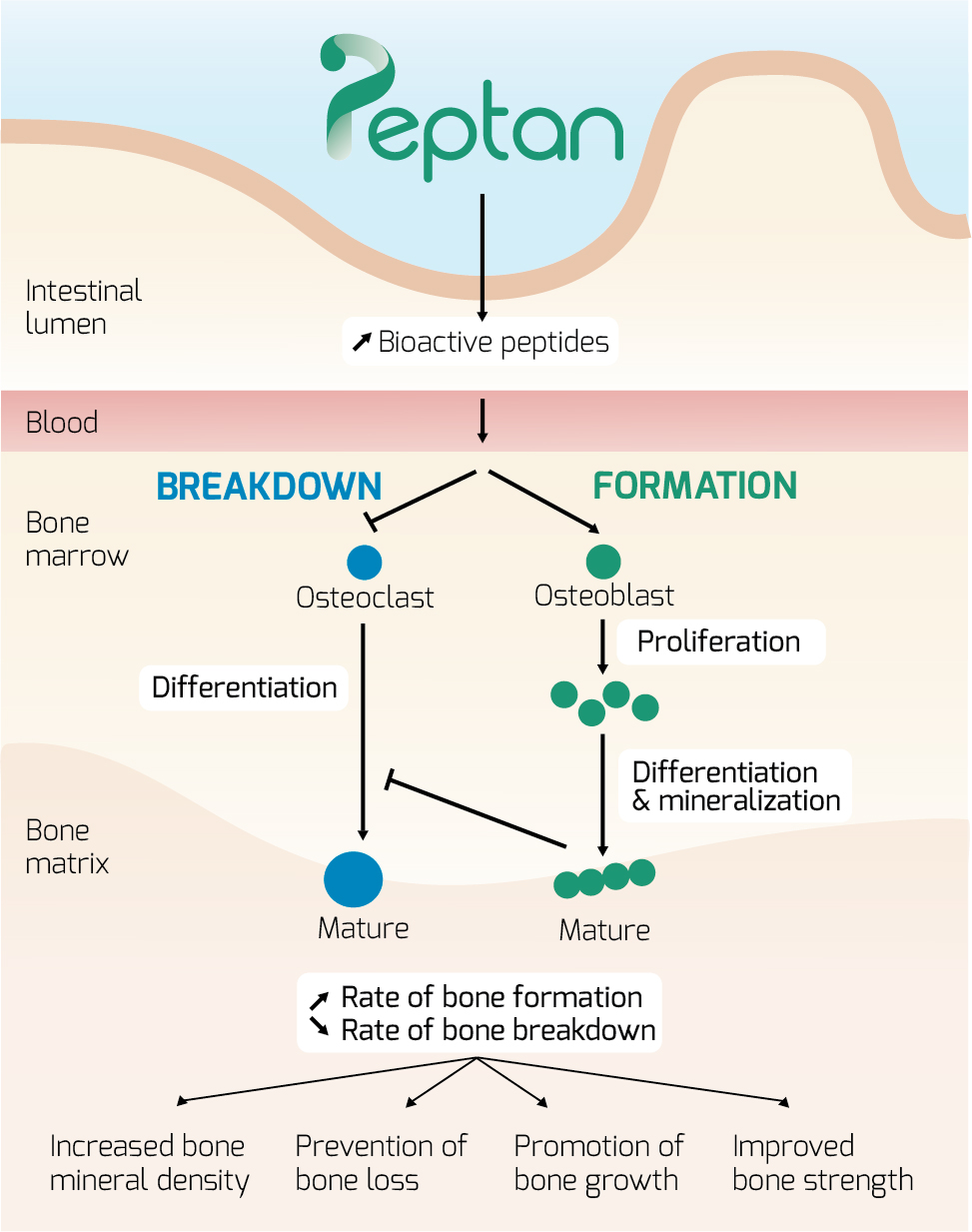So in this article we’re going to look at what bone health is, the best way for supporting bone health, and the latest science showing how collagen peptides can help support healthy bones.
What are bones and what is bone health?
Bones give the body structure and support, enable movement, and give protection to vital organs. They store calcium that can be released into the bloodstream when the body needs it. Most of the body’s blood cells are produced within the soft center of the bone.
Bones are made up of hard and soft tissue components. The tough outer layer is known as cortical bone, while the spongy inner is known as trabecular bone.
There are several types of bone cells: osteoblasts, osteocytes and osteoclasts. These enable the growth and regeneration of bone throughout a person’s life.
The whole bone is supported by a matrix of a gelatinous protein called type 1 collagen in combination with other organic substances. As a whole, this is known as the osteoid. Bones are formed when the osteoid binds with calcium phosphate, which sets into a hard substance.
From birth through to adulthood, the skeleton is created by continuous bone formation. This process is known as bone modeling and generally stops as soon as you reach adulthood.
When the bones are fully formed they go through a continuous process of replenishment. Essentially the body cleans away the old cells and creates new ones to maintain the mass of the bones. This process is known as bone remodeling.
So bone health is the relative condition of the above mentioned processes. If the processes become compromised in any way, it could make a person more susceptible to fractures and other uncomfortable bone conditions.

Are people actually concerned about bone health?
Older people are concerned with bone health because bones get weaker as we age, which makes us more susceptible to fractures. This is particularly the case for post-menopausal women.
But it’s not just older people that are concerned about bone health. Younger people are becoming aware that lifestyle choices can impact upon future health. So they’re thinking ahead and looking for ways to keep their bones strong and healthy into old age.
Things you can do to support your bone health
There are several tried and tested ways to support your bone health, all of which center on making healthy lifestyle choices.
Be Active
Not getting enough exercise can cause your muscles and bones to lose strength. Being active is particularly important for older people as they are most at risk of suffering from bone-related conditions.
Get Enough Calcium
Calcium is essential for maintaining bone strength. If you don’t get enough calcium in your diet you’re at risk of developing weaker bones. Good sources of calcium are dairy products such as milk and cheese. Soya beans, nuts and various other alternatives are available for vegans.
Get Enough Vitamin D
Vitamin D enables the body to absorb calcium, which is vital for maintaining good bone health. The best way to get Vitamin D is from sunlight, preferably during spring and summer. Simply getting out and about with some of your skin exposed will top up your Vitamin D levels.
You can also take Vitamin D and calcium supplements together to help maintain good bone health.
Maintain A Healthy Weight
Being both underweight and overweight can lead to weakened bones and increase your risk of bone fractures.

Collagen Peptides can support bone health too!
According to a new pioneering study carried out by French National Institute for Agronomic Research (INRA) in collaboration with Rousselot [1], collagen peptides can have a positive impact on bone metabolism; in other words, collagen peptide supplementation can support the body’s process of maintaining bone strength.
The study made use of a groundbreaking approach that involved clinical screening as well as in vivo and ex vivo research. The findings show that, when taken as a supplement, collagen peptides (which are easily absorbed by the body) can boost the remodeling process by stimulating osteoblasts (the cells associated with bone formation), while at the same time inhibiting osteoclasts (the cells that cause the bone to break down).
These results support previous studies that found indications of bone cell activity being linked to collagen peptide supplementation[2][3].
With the available evidence mounting, it’s safe to say that collagen peptide supplementation can be used alongside calcium and Vitamin D as part of a combined approach to supporting good bone health.

You can find out more here. For a deeper dive into the subject, download our latest whitepaper.
References:
[1] https://www.ncbi.nlm.nih.gov/pmc/articles/PMC6627680/
DISCLAIMER:
Rousselot makes no representation or warranty, whether expressed or implied, as to the accuracy, reliability, or completeness of the information, nor does it assume any legal liability, whether direct or indirect, for any information. Use of this information shall be at your discretion and risk. Nothing herein relieves you from carrying out your own suitability determinations and tests and from your obligation to comply with all applicable laws and regulations and to observe all third-party rights. This product is not intended to diagnose, treat, cure, or prevent any disease.
